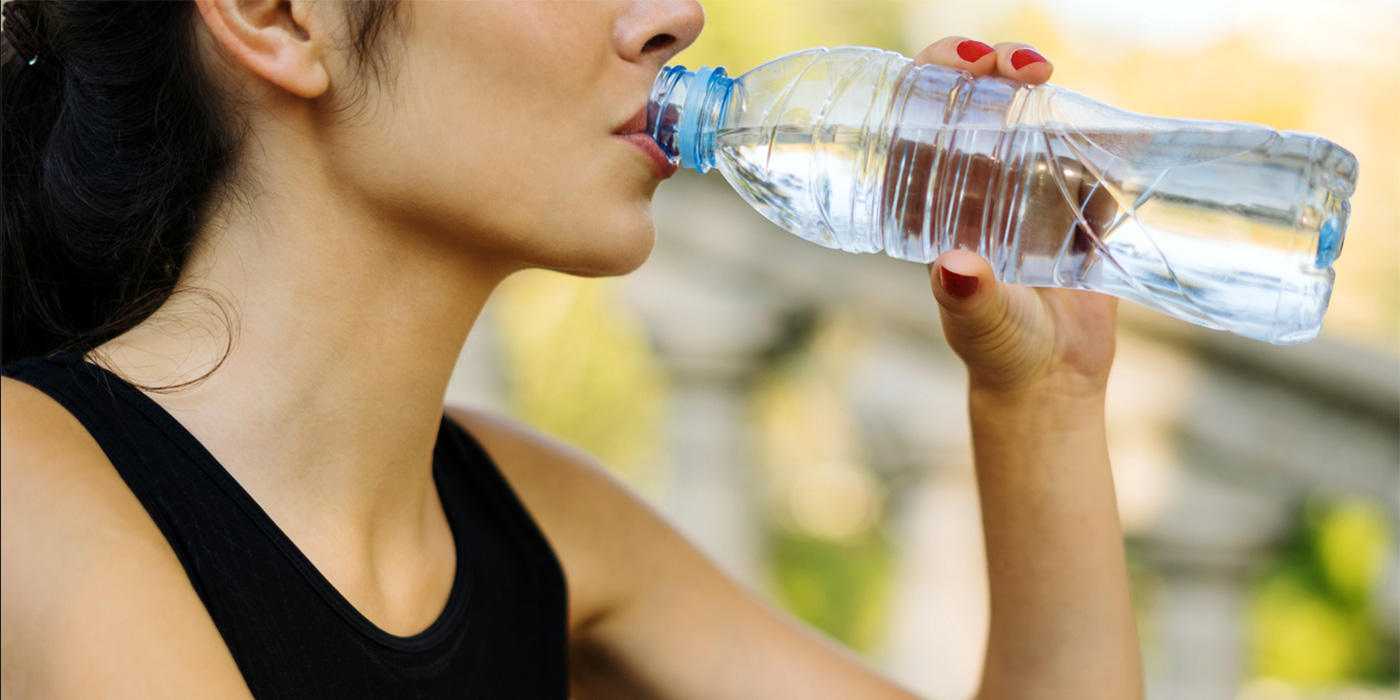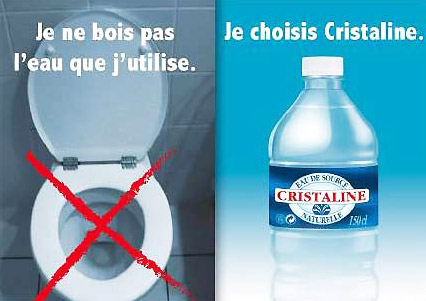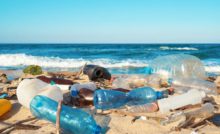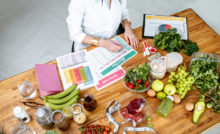Is bottled water dangerous ?


Updated article : 26/01/2019
According to nutritionist Hélène Baribeau to stay healthy to drink between 1,5 and 2 L of water per day. It remains to know what water preferred, that of the tap or that of the bottles ?
According to Chambre Syndicale mineral waters, a French person consumes every year 125 L of bottled water (against less than 40 L in 1970). In 2016 this represented a consumption of 8,3 billion liters for the entire French population.
In 2006, the brand CRYSTAL launched the slogan “ Anyone who claims that tap water always tastes good should not drink it often ! » or « I do not drink the water I use » (see advert below) that caused a real controversy. The brand attracted a lot of criticism and was notably accused of wanting to scare consumers about the quality of tap water, which is one of the most monitored foodstuffs in France.. The tap water is also sometimes even more monitored than some bottled water.


We see here the main limits of consumption of bottled water that are the cost, the environmental impact and finally, We ask the question of whether bottled water is actually better for health.
The cost
The cost compared with the tap water is much higher. We believe that drink bottled water costs between 200 and 300 times more expensive than to drink water from the tap (This calculation is approximate because the price of water supply and the price of bottled water can greatly vary depending, respectively, of the region and the brand). We see immediately that the price differential is enormous and that consume bottled water is a luxury !
The environmental impact
According to the Swiss study “ Ecobilan drinking water - mineral water " produced by ESU-Services (expert office in life cycle analysis), the tap water is 1000 greener times only mineral water (bottled or cylinder) !
A diagram is worth a thousand words :
Source : From the source to the glass, the life cycle of drinking water
Source : From the source to the glass, the life cycle of drinking water.
A huge amount of energy and waste
In 2014, the France has produced 12 billion liters of bottled water more than double what had happened twenty years ago. In 2016 in the world, they are not less 480 billion plastic bottles which were produced (more than 15 000 bottles per second !).
This production is done with oil, a non-renewable energy. Huge amounts of oil used in the manufacture of plastic bottles, raw material that must be imported to the bottling plant, who will also consume energy for the manufacture of containers. Once conditioned, Water is routed over many kilometers by rail, ship or truck. A water bottle travels an average 300 km, bottling recycling.
It is completely absurd from an ecological point of view to find bottles Perrier ou d’Evian in Los Angeles in the US, for example, While the water flows from taps !
A very low life expectancy
A bottle of water, once in the hands of consumers, has an extremely low life expectancy ! Indeed, the content is quickly drunk and the bottle ends up in 44 % cases in the trash with household waste According to Eco-Packaging.
A very long degradation
A plastic bottle is not or is only marginally degradable naturally. It is estimated thata bottle puts between 100 and 1000 years to degrade in nature ! [6].
Unfortunately bottles still often end up in landfills. (in developing countries) and are thus buried underground in the best of cases or finish in the oceans. Cylinders degrade more quickly in the sea (with the salinity of water and solar radiation). These small fragments are swallowed by birds, fish, etc. contaminating the entire food chain and further causing slicks of viscous plastics. « Concern grows over the mountains of plastic accumulating in the environment. To the point that today there is a veritable ocean of plastic » [1].
After seeing only consume bottled water is both bad for the environment and for its portfolio, is it still benefits to drinking bottled water ?
Health impacts
Various plastics :
PETE or PET : Polyethylene Terephthalate
Mineral water bottles, soft drinks, jus de fruits…
Milk bottles, bouchons de bouteille…
Bottles of mineral water, wine, vinegar, boxes food, food movies, vials, solvants…
Food movies, trays, vials, sac de congélation…
Yoghurt pots, baby bottles, barquettes de beurre et de margarine…
PS : Polystyrene
Yoghurt pots, cutlery, assiettes et verres en plastique…
OTHER (Other) : Polycarbonate generally
Baby bottles, rigid plastic cups, food containers, plastic bottles (milk, ketchup, water, etc.)…
The problem of plastic incompletely
Categories 3, 6 and 7 are to be avoided !
3) PVC is considered hazardous to health and the environment. It contains lead, cadmium, of phthalates and DEHA.
Bis adipate (2-ethylhexyl), also known as DEHA, is a chemical that may cause cancer (study on laboratory animals), to have negative impacts on the liver, the kidneys, the spleen and bone formation [4] [5].
6) Polystyrene containing styrene is considered to be toxic to the brain and nervous system. It has adverse effects on the liver, the kidneys, the stomach and red blood cells.[2]
7) Plastics in this category may contain Bisphenol A (BPA), a disruptor. BPA migrates plastic to liquid in larger proportions when the liquid is hot and/or fatty.
We see that all plastics are not safe and must be wary when buying not only bottled water but also other foods packed with plastic. It is important to know what type of plastic affects your drink or food. In general, you will find these bottles on the background codes, containers, plugs, etc.
Plastic bottled water contains two times more hormones than tap water
According to a study by two German researchers, published in the journal Environmental Science and Pollution Research, the plastic release into the water of hormones (males or females) that we call endocrine disruptors. These hormones are likely to disrupt the reproductive functions of the man, even at very low doses. The study is made on 20 packaging of mineral waters in Germany that contain all of the PET (Polyethylene Terephthalate) and water in containers in glass in order to make a comparison. “In twelve of them, the researchers noted in the water from plastic bottles twice higher hormonal activity” [3]. This revelation immediately boosted industrial plastic which specify that the study does not conclude a health risk.
Conclusion
Even if the tap water is very uneven from one territory to another (water is in large urban areas controlled significantly more than in rural areas which further also a more water contaminated by agriculture), We see that consume bottled water night portfolio, to the environment, et “pourrait” nuire à la santé.
To know the quality of water from the tap in his region : Result of sanitary control of water quality
Furthermore, some alternatives exist :
- The filter jug (read the article : Filter jugs : a health hazard ?)
- The water softener (Article coming soon)
- The gravity filter (full test coming soon)
However, if you continue to drink bottled water, we recommend that you regularly change mark. Indeed, some of these waters contain a lot of minerals which can, in overdose, cause health problems. The waters as Volvic, Perrier and Evian, for example, have lower mineral content and better suited for daily consumption.
Similar articles :
- Initial analyses on the traces of drugs in water
- Filter jugs : a health hazard ?
- Our water is polluted and toxic
- Dangers and risks of Bisphenol A (BPA)
Main references :
[1]. Science et Vie – Le plastique c’est fantastique
[2]. Smart Plastic Guide – Institute for agriculture and trade policy
[3]. Le Figaro – Faut-il bannir les bouteilles d’eau en plastique ?
[4]. The Government of Canada chemical substances Web site (www.chemicalsubstanceschimiques.GC.ca)
[5]. Technical Fact Sheet on Di (2-ethylhexyl) adipate.
[6]. Consoglobe.com
The quality of water packaged in France
SDWF (Safe Drinking Water Foundation in the Canada)
HANDLES (National Safety Agency)
Chambre Syndicale mineral waters
"LCA water - mineral water" conducted by ESU-Services (expert office in life cycle analysis)
From the source to the glass, the life cycle of drinking water
Fiche technique – Du plastique à la bouteille et le plastique des bouteilles (CEREMAP : Center for studies on recycling of plastics).
Recent Posts
Cakes, Candy : Warning on nanoparticles
100 % tested products contained nanoparticles ! [...] Les résultats de cette expérience ont…
How to eliminate toxins ?
After a series of festive meals, caloric menus, alcoholic or carbonated drinks,…
Plastic, not so fantastic!
Plastic pollutes the environment, we all know it. Il faut aussi rappeler que les objets…
How to eat healthy during lunch break ?
At work, lunch breaks are often done on the go, en quelques minutes et…
Eat healthy, it's really possible ?
These last years, le bio et le sain se sont imposés avec insistance dans nos…
Sausages and merguez salmonella
The company L’Atelier du Valois has recalled batches of "Plateau variegated" suite…




View Comments
Hello,
So the comparison is complete, il faudrait aussi se pencher sur ce que les tuyaux laissent dans l'eau du robinet et surtout, especially, on the comparison between the quality of mineral water / tap water, car c'est l'impact possible sur la SANTE individuelle, his children, bien avant l'impact sur l'environnement et même sur le porte-monnaie, who will be taken into account by a person reading your article.
( = Une personne qui s'interroge sur l'empoisonnement silencieux de son alimentation, or a person who is already victim and sick.)
Thank you for your constructive comment.
Nous partageons l'idée qu'il faudrait comparer concrètement la qualité des eaux en bouteille et celle du robinet. However some difficulty arises :
-La qualité de l'eau du robinet varie très fortement d'une région à l'autre (un lien vers le site du gouvernement est tout de même affiché dans l'article pour connaitre la qualité de l'eau de sa commune).
-Il existe un grand nombre d'eaux minérales en France qui n'ont pas toujours le même type de contenant (various plastics, therefore different possible incompletely).
L'étude menée serait ainsi titanesque mais très utile pour la santé.
A study of this kind must be done by organizations (actually)independent because the financial stakes are huge !
Si des organismes vont dans ce sens nous ne manquerons pas de retransmettre l'information.
the plastic taste is recurring in different brands, Does this mean an infection ?
IF your water has a plastic taste, c'est que le seuil de détection de vos papilles est dépassé. So you drink (also) plastic.
empty plastic bottle was half a, d'eau de vittel, closed, and put out a daylight, buvée the five days later, elle sent l’alcali c'est un poison
dangerous, ne jamais mettre une bouteille d'eau minéral au soleil c'est également un poison dangereux
Hello,
Je vous trouve tout de même bien clément concernant l'eau du robinet, dont on sait que le traitement laisse passer certaines substances nocives quand il n'en rajoute pas de nouvelles.
Although analyses are "good", on ne trouve que ce qu'on cherche... And some administrative standards (qui auraient parfois besoin d'être revues) n'est pas forcément un gage de qualité.
Hello,
Indeed, nous sommes bien d'accord avec vous, l'eau du robinet n'est pas parfaite (drug residues, et toute une série d'autres substances, see article "Our water is polluted and toxic").
Cet article a pour but de montrer que l'eau en bouteille ne l'est pas non plus. She also suffers, to a lesser extent, of various contaminations. Pour l'eau en bouteille le problème économique et écologique se pose également.
Pour l'instant il n'y a pas, to our knowledge, a water "perfect" ou qui s'en rapprocherait. Les pouvoirs publics ont en effet de gros efforts à faire pour améliorer la qualité de l'eau.
Voici quelques vérités en ce qui concerne l'eau en bouteille qu'il fait bon savoir..... but, as pointed out by some other comments, l'auteur de l'article ne parle que des dangers de l'eau en bouteille mais "forget" to mention that :
- l'eau du robinet, si elle est surveillée en France ne l'est QUE pour certains polluants (nitrates essentially, whose most common display level on the back of their invoice)... but alas for the consumer, It also contains drug residues (chemotherapy and other antibiotics absorbed by patients and naturally rejected by urine and feces), très souvent l'eau est traitée dans les stations d'épurations soit aux Ultraviolets ou aux sels d'aluminium, en plus du chlore et d'autres "whatnot" of the same kind, While all these pollutants is very often found in our faucet at doses not negligible.
A remarquer d'ailleurs, que si l'on admet le principe de l'homéopathie (l'eau d'une dissolution élevée, telle que plus aucune molécule chimique ne s'y trouve, but that is effectively !) il est permis de se demander quel est l'effet à plus ou moins long terme sur nos organismes de toutes ces pollutions "minimes" below the thresholds "authorized", voire indétectables.... mais bien réelles.....
Le sujet n'est pas prêt d'être tranché, except to immediately stop any form of chemical pollution, ce qui pourrait d'ici quelques siècles, Maybe "redress the balance"....
On peut toujours rêver.....
Your remark is relevant and target the problem we have in France, nous n'avons pas à notre disposition une eau "perfect", without risk.
Cet article se concentre principalement sur l'eau en bouteille et la compare de temps en temps avec celle du robinet. Furthermore, ma clémence face à l'eau du robinet est tout de même relative (voir l'article "Our water is polluted and toxic").
It is time that the public authorities take action (règlementation de l'utilisation des pesticides et autres, des antibiotiques pour l'élevage, filtration des traces de médicaments dans l'eau etc, etc.) to ensure citizens a water without any risk (more or less long term) for health.
Le lien concernant le résultat du contrôle sanitaire de la qualité de l’eau est utile à condition de consulter l'historique annuel des analyses car au niveau mensuel les analyses sont bien plus succintes et peuvent indiquer une eau conforme aux normes bactériologiques et physico-chimiques si tous les éléments problématiques ne sont pas testés. In my case, il y a un excès d'arsenic et de fluor qui ne peut être résolu que par une filtration à osmose inverse... donc impossible pour moi d'utiliser une simple carafe filtrante et je n'ai d'autre choix que d'utiliser de l'eau en bouteille pour ma consommation "internal"...
Il y a beaucoup d'empoisonnement qui se comprennent facilement en expliquant le mouvement de l'air qui pénètre dans la bouteille lorsque l'on boit à même celle-ci, accompagné de manger qui se trouve encore dans notre bouche qui par le mouvement d'air fait pénétrer de ce manger dans la bouteille. So if the bottle is closed and later completed, le temps passé jusqu'à la prochaine gorgée d'eau de cette même bouteille, Depending on the ambient temperature, laissera plus ou moins la chance aux aliments de se décomposer dans la bouteille pour ensuite faire place aux bactéries que l'on ingurgitera lors de la prochaine gorgée d'eau de cette bouteille.
J'en ai fait l'expérience et après quelques heures, j'ai simplement senti l'eau dans la bouteille et c'était dégoutant.
Since, si je dois prendre de l'eau à même une bouteille, je vide la balance de l'eau qui reste...
Bonnes randonnées en étant averti et prévoyant...
l'eau en bouteille peut être dangereuse parce que imaginon que l'eau et mal traiter, les bactérie et virus peut être presente dans l'eau donc oui je pense que c'est dangereux
January 16 2013
Expert Allo in drinkable water.
Je bois de l'eau de source DÉMINÉRALISÉE, It seems that our body
n'a pas besoin des minéreaux contenus dans l'eau.
Gold, just like our cat, are we correct ?
Bye, Let's be happy, la vie est claire comme l'eau.
Simon
Les tuyaux d'adduction d'eau du robinet son t en PVC .... non ?
Donc l'eau du robinet a séjourné dedans pendant longtemps ... exact ?
and not, There are not PVC ,seul les tuyaux d'évacuations des eaux usées sont en pvc.
lecteurs il est tres important de pousser votre recherche personnelle sur l'eau sortie du robinet,l'article n'a pas pris le soin de mentionner le cote nefaste de cette eau, gardez vousi de boire l'eau du robinet,les Nazis utilisaient l'eau du robinet pour faire quoi? c'est a cette belle question qu'il faut chercher a avoir une bonne reponse et vous serez convaincu.
Si vous avez de l'argent suffisant pour faire la guerre aux detracteurs industriels mechants comme les producteurs des pesticides mondiaux choisir l'une des trois eaux sus citees.Les indusrties dans ce domaine ne font pas cadeau et ne jouent pas.